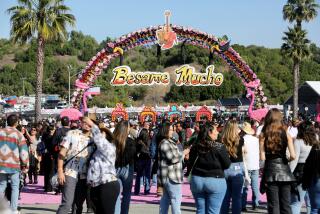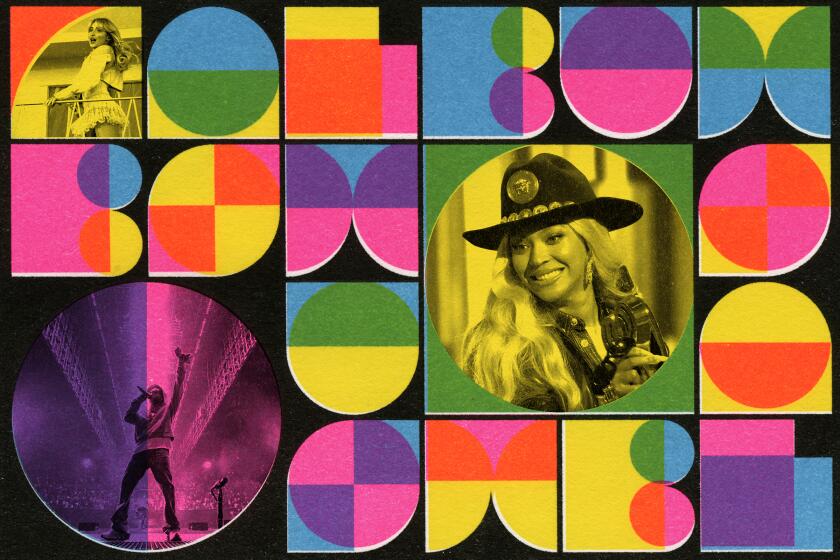Dancing to the Cuban Beat : THE MAMBO KINGS PLAY SONGS OF LOVE <i> by Oscar Hijuelos (Farrar, Straus & Giroux: $18.95; 405 pp.; 0-374-21025-0) </i>
In the late 1940s, the jazz scene from 52nd Street to Harlem blazed with the innovations of Charlie Parker, Miles Davis and Thelonius Monk. Be-bop was the language spoken in the halls of jazz. Dizzy Gillespie, introduced to Afro-Cuban rhythm, incorporated the sound into his music and cu-bop--as they called it--became a part of the jazz repertoire.
But even without the help of be-bop, Latin music exploded on its own. One needed only to walk down 116th Street or 125th Street in Harlem to listen as every record shop blared the strains of Chapasau & Damaron’s “Anabacoa,” the earliest mambo record to hit the charts.
Clubs and halls from the Bronx to Brooklyn overflowed with dancers improvising steps to the cha-cha and in the early 1950s, this reader thought nothing of going to the old Broadway Palladium four nights out of seven to cheer for “Killer Joe” Piro whose fancy footwork captured the imagination of a generation.
So it was a pleasure to read “The Mambo Kings Play Songs of Love.” Against this background of Latin and jazz, Oscar Hijuelos, a writer of considerable talent, introduces Nestor and Cesar Castillo, two brothers newly arrived from Batista’s Cuba to make their way in New York’s music world.
At that time, the Cuban nightclubs and casinos--controlled by American gangsters, where white musicians entered through one door and mulatto and black musicians entered through another and the pay was wretched for all--offered no future.
Told in a series of flashbacks through the eyes of Cesar, the older brother, this story bares two dramatic struggles: of Nestor, who loved too much, and Cesar, who never learned how.
The story opens with Cesar, now a physical and emotional wreck at age 64, holed up in a small room in the seedy Hotel Splendour on 125th Street in Harlem, the scene of many of his past rendezvous. He has brought with him a battered cane suitcase containing some old recordings, faded photos, and letters--mementos from his glory days as the Mambo King. He has also brought a huge quantity of whiskey with which he plans to drink himself to quick and merciful death rather than continue to suffer the ravages of end-stage congestive heart failure.
The first quarter of the novel is crammed with more than enough information to satisfy any musicologist interested in the 1950s scene. This is written in an almost scholarly style but when Hijuelos describes the death of the legendary drummer, Chano Pozo, even though told thirdhand by another musician, it is a powerful rendering: “I remember when Chano died. I was down on 52nd Street when I heard the whole thing. Chano was up on 116th Street at the Caribbean Bar and Grill, looking for this man who’d sold him some bad stuff. That was in the morning. He’d injected it, gotten sick, and then later went out on the street looking for him. He found him in that bar, pulled a knife on him, and demanded his money back. Now, the man wasn’t afraid of Chano and Chano wasn’t afraid of the man; Chano had already been shot up and stabbed in Havana and had survived it, you know, so that Chano took his knife out and lunged at the man, even though he’d pulled out a gun: Chano kept coming at him because he thought the spirits were protecting him, but these spirits, Yoruba spirits, couldn’t stop the bullets from tearing him up and that was that.”
Cesar and Nestor arrive in New York at a time “When every Cuban knew each other” and, after sitting in with other bands, decide to form their own group, the Mambo Kings. They play the halls and clubs and sing songs of love. The high point comes when they are discovered by Desi Arnaz who invites them to Hollywood to appear on the “I Love Lucy” show.
Here, the description of the technical aspects of television production gets in the way, slowing the forward action, but this is a minor complaint because the characters are so skillfully rendered. The story really comes to life when Nestor meets Delores, a young Puerto Rican girl who works as a maid for a Park Avenue man “so rich he is unhappy.”
Through this relationship, we are taken via yet another flashback to Cuba, to an earlier love affair Nestor has had with Maria, “the beautiful Maria of my soul.” The affair, obsessive, passionate and explicitly detailed, ends before the brothers emigrate but this love remains the source of Nestor’s melancholia.
By turns, Cesar reflects on his own tumultuous relationships. His short, unhappy marriage ended in disaster but his macho posture continued to play havoc with every woman he meets. While Nestor’s pain is all-consuming, the Mambo King, as Cesar comes to be called, keeps right on going.
The band achieves a small measure of fame--if not fortune--in the local dance halls. Hijuelos captures in poignant detail the life of the musicians: men who work menial, sometimes back-breaking jobs during the day and play to crowded dance halls at night. The life is sad, precarious, boisterous, exciting, and sometimes dangerous.
Night time is the glory time as they sweat through hot rumbas and mambos and soulful ballads, and at 3 a.m. crowd into family kitchens to feast on huge platters of pork chops, paella, yellow rice, fried plantains and more rum.
It is lonely, the 4 a.m. subway rides clutching a bass fiddle or a horn and trying not to fall asleep or fall prey to the stick-up man.
The story weaves back and forth in time contrasting the present Cesar, a swollen wreck who has taken to wearing a girdle and whose urine is now streaked with blood, to the young virile man of 30 years ago who was attractive to legions of women.
He studies the photos and listens to the recordings of the Mambo Kings. And drinks. Each glass of whiskey produces more, and sadder, memories. He is plagued by the circumstances of Nestor’s tragic death, the breakup of the band, the difficulty of trying to live up to a reputation he no longer deserves.
He reminisces about his trip to Cuba and his failure to establish a relationship with his estranged daughter. Castro’s revolution has changed everything and everyone; his wife has now married a high-ranking official in the regime and his daughter is a member of the state-sponsored ballet. Ideologically and emotionally, these women and everything they represent are now beyond his reach. He returns to New York to witness more change: the intrusion of a different type of music, hard drugs, more crime, the deterioration of a sense of community.
And saddest of all is the change in his latest relationship with a much younger woman named Lydia, who tolerates him because he is generous and good to her two children.
The affair is initially invigorating, then gradually degenerates into scenes of rage, fear and jealousy as he struggles to come to terms with the fact that, despite his enormous sexual capacity, time has passed and he--the Mambo King--has grown old.
Hijuelos has painted an erotic and desolate landscape where people surge to life and diminish with terrifying exactitude. And where macho men like Cesar--handsome, proud, and mired in the disillusionment of change--find no way out.
More to Read
The biggest entertainment stories
Get our big stories about Hollywood, film, television, music, arts, culture and more right in your inbox as soon as they publish.
You may occasionally receive promotional content from the Los Angeles Times.









